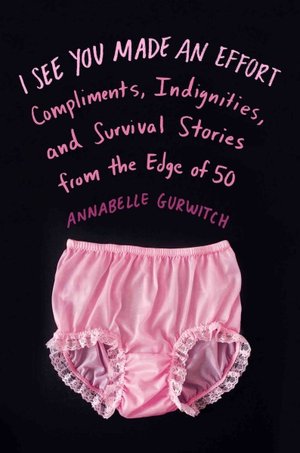Books |
I See You Made an Effort: Compliments, Indignities, and Survival Stories from the Edge of 50
Annabelle Gurwitch
By
Published: Sep 14, 2014
Category:
Memoir
The death of Nora Ephron created a job vacancy, and now that the mourning period is over, we may expect a slew of books from women who can, as Ephron did, use their large brains on small subjects.
Lena Dunham, the writer, director and star of the HBO series “Girls,” is the leading contender for Next Ephron by sheer virtue of her ubiquity. But it doesn’t hurt that, in the last year of her life, Ephron befriended Dunham and more or less anointed her. Dunham’s book — “Not That Kind of Girl: A Young Woman Tells You What She’s ‘Learned’” — rolls out this month with the kind of publicity campaign usually reserved for political candidates backed by the Koch brothers. [To buy “Not That Kind of Girl” from Amazon, click here.]
The thing about writing that’s coy and cute and tongue-in-cheek is that a little goes a long way. A white woman with a good roof and nice clothes banging on about her First World problems — sorry, but I think she’s missing the point. So I start books by clever white women with low expectations.
Annabelle Gurwitch acts and writes in Los Angeles. She says she’s a fringe player, but her bio checks off all the boxes: NPR. HBO. “Dexter.” “Seinfeld.” Plays, books.
And now she’s hit 5-0. That’s rich soil. And an easy target, like Christopher Hitchens teeing off on Mother Teresa.
Here’s how “I See You Made an Effort: Compliments, Indignities, and Survival Stories from the Edge of 50” starts:
On the day I turned forty-nine the first solicitation from AARP appeared in my email in-box. At a glance, I thought it might be an ad for white-collar prison uniforms. A couple is pictured dressed in matching cotton pastel sweaters and pleated Dockers. The entire outfit screams, Here, take my libido and hold it for the rest of my life, which won’t last much longer anyway. The man has his arms encircling the woman’s waist. Is he propping her up because she’s suffering from osteoporosis, or helpfully disguising her muffin top? The expressions on their faces can only be described as resigned.
Promising. I read on:
The mothers I had grown up with were disappearing before my eyes. My own mom was diagnosed with breast cancer…
My son wasn’t speaking to me. I was unemployed and my parents urgently needed to sell my childhood home.
Sick mom? Silent son? Urgent real estate issues?
This felt real. I got more interested.
“Dear God, Please let me be fuckable at fifty,” she writes, at the start of a piece about falling in crush with a young man who works the Genius Bar at an Apple store. She goes to an upscale store. (Better believe the word “scrub” will appear.) She goes to a rock concert with her teenage son. When she is hired to appear at a charity event at the Beverly Wilshire Hotel, she avails herself of a luxury suite and the spa.
And then, on page 68, she picks up the phone and learns that one of her oldest friends has cancer. What kind? Pancreatic. Gurwitch tries for a light tone — “When she started the treatment… it was just like Samantha’s breast cancer story line in ‘Sex and the City” — but it cannot last: “…. except that Robin didn’t have a lavish wardrobe, designer shoe collection, sex, the city, or any chance of recovery.” And from there we’re in for ten pages of death-at-work that is harrowing, heartbreaking and, suddenly, brilliantly and wonderfully ironic.
She had me at “pancreatic cancer.” [To buy the book from Amazon, click here. For the Kindle edition, click here.]
From there, I cruised. (My wife, for the record, chortled at almost every page. But she’s over 50 — what does she know?) And now I was amused by Gurwitch’s list of First World problems:
“If I could just lose these ten pounds… would more people come to my funeral?”
“If I watch some porn, will my kids wake up and come in on me?”
“Why didn’t I answer the phone and go with Michael to D.C. that weekend in 1986?”
“Why did I major in the humanities? I should have majored in the amenities.”
“I will get through this. I can do it. I can do it.”
At 50, I suspect, that last line passes for courage. Lena Dunham is 28. Good luck with that.


